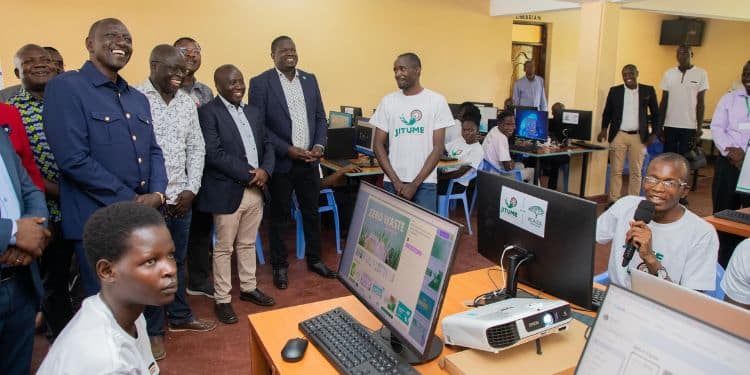For many Kenyan graduates, the excitement of finally graduating from university or college often fades quickly in the face of a harsh job market. With limited formal employment opportunities, thousands of unemployed young people are forced to adopt creative and sometimes gruelling survival tactics as they figure out their next move out of unemployment.
From menial jobs to online gigs and even daring to seek work abroad, the path is rarely straightforward, and each option comes with its share of challenges.
According to the Federation of Kenya Employers (FKE), the overall unemployment in Kenya is at 12.7 per cent. Youth (15 – 34-year-olds), who form 35 per cent of the Kenyan population, have the highest unemployment rate of 67 per cent.
FKE notes that over one million young people enter the labour market annually without any skills, some having either dropped out of school or completed school and not enrolled in any college.
Survival tactics for unemployed graduates in Kenya
One of the most common lifelines of being unemployed is taking up menial jobs, locally known as “kazi za mkono.” These jobs offer quick but unpredictable cash and might not require a CV.
However, they demand an early start, strong physical stamina, and a bit of streetwise knowledge about where to find daily opportunities.
In Nairobi, for instance, casual workers often gather at specific spots each morning, hoping to be picked for manual tasks that pay by the day.
You show up early, queue with hope, and pray to be picked. In Eastleigh, offloading cargo containers on Mondays, Wednesdays, and Saturdays pays between Ksh300 and Ksh500, depending on the goods.
At Chandaria Industries in Baba Dogo, workers arrive by 7:00 AM for tissue and paper deliveries, earning around Ksh600 per day. Just nearby, Kenchic offers physically demanding factory work at Ksh500 daily.
Some gigs pay slightly more. Harleys Pharmaceutical in Westlands pays Ksh750 for a full day (8 AM – 6 PM), while Pembe Flour Mills pays Ksh1,000 on Mondays — but you must be there by 5:00 AM with your ID.
GM Red Cross, near the town-bound matatu stage, offers roles in packing and transport, paying between Ksh700 and Ksh1,000.
Other menial jobs
Opportunities also exist at the Country Bus Station near Muthurwa, Kamukunji, and Gikomba, where youth hustle as matatu recruiters, earning Ksh150 per vehicle filled.
In Gikomba’s Burma, others scrub intestines from slaughtered animals, load goods, or wash utensils — the pay is negotiated based on the task.
At Dawanol near EPZ and several companies along the Lunga Lunga–Mareba stretch, casual workers earn Ksh500 to Ksh1,000, depending on availability and effort.
The Kenya Glass Industry near Kasarani Stadium is another hotspot for casual labor, especially on Wednesdays, Fridays, and Sundays.
Workers there can handle delivery, machine washing, or loading and offloading, and with chances of earning as much as Ksh1,000 per day — one of the higher rates among Nairobi’s casual jobs.
Other opportunities exist at Kenya Breweries Limited in Ruaraka, where roles like machine operation and general maintenance can fetch about Ksh10,000 per week, though competition is stiff and workers must arrive early to improve their chances.

Yet, none of these jobs are guaranteed as it’s a gamble every day. Always carry your original ID. And even if you’re not picked, network — exchange numbers, make friends. In this informal job circuit, your next opportunity might come through a call from someone you met in line.
Also Read: 7 Nairobi Spots to Find Daily Manual Jobs Paying Ksh500 to Ksh1000
Despite being demanding and low paying, these menial jobs offer immediate income and can help graduates survive in tough times.
However, they can also be physically exhausting and come with social stigma, as society often views them as “unfit” for degree holders.
Remote jobs
Beyond manual work, many graduates are also diving into remote online jobs like academic writing, transcription, graphic design, customer service, and virtual assistance.
Platforms such as Upwork, Fiverr, PeoplePerHour, and TranscribeMe have become popular gateways for Kenyan youth looking to earn from anywhere with just a laptop and internet connection.
These gigs offer flexibility and, in some cases, can pay better than local casual jobs — especially for those who build a strong profile and secure consistent clients.
A well-rated freelancer on Upwork, for instance, can earn anywhere between $10 (Ksh1290) to $50 (Ksh6450) an hour depending on skill and niche.
However, the competition is stiff, and beginners must be patient, professional, and proactive. A tip for newcomers: start by offering competitive rates, always meet deadlines, and ask satisfied clients to leave reviews — this builds your credibility and visibility.
Still, online work isn’t always stable. Income can be seasonal and unpredictable. Some platforms have irregular workflows, and freelancers often face tight deadlines, difficult clients, and payment delays.

Certain types of work — particularly academic writing — also raise ethical red flags, as Kenyan graduates are often used to produce work that is submitted by students abroad, creating a cycle of intellectual exploitation.
Content creation and internships
Another increasingly viable path is content creation. With the right strategy and consistency, young people are turning platforms like TikTok, YouTube, Instagram, and Facebook Reels into income sources.
Monetization comes through ad revenue, brand sponsorships, affiliate marketing, or even fan support platforms like Buy Me a Coffee.
The barrier to entry is relatively low, but success requires niche targeting, quality content, and audience engagement.
Another popular route is taking on internships, often unpaid or minimally paid. Internships help graduates build networks, gain hands-on experience, and strengthen their CVs.
In some lucky cases, they can lead to permanent employment. However, the reality for many is a seemingly endless cycle of internships without a clear path to a real job, leaving them financially strained and frustrated.
Volunteering is another survival strategy, where graduates engage in community work, NGOs, or religious organizations.
It can help build valuable soft skills, foster meaningful relationships, and sometimes open unexpected doors.
Also Read: Recruitment Process of Kazi Mtaani Under CRSP Program
But with no pay, it can be financially draining, and some organizations may exploit volunteers, taking advantage of their desperation.
Some graduates opt to further their studies, hoping an advanced degree will give them a competitive edge.
While postgraduate studies can expand one’s knowledge and specialization, they also come at a significant financial cost and do not guarantee employment.
In fact, many young people end up accumulating more debt and delaying financial independence, only to remain jobless after graduation.
Kazi Majuu
The option of working abroad, commonly referred to as “kazi majuu,” also tempts many graduates. The promise of higher pay and a fresh start is appealing, but this path is fraught with risks.
Many Kenyans who migrate to Gulf countries and other destinations face harsh working conditions, withheld pay, and sometimes outright abuse. The emotional toll of being far from family and the social isolation experienced abroad can be severe
Worse still, others lose hundreds of thousands to rogue recruitment agencies, only to be left stranded after being promised non-existent jobs abroad.
When seeking employment overseas, it is advisable to ensure that the employment agency is registered before applying for jobs or risk being conned.
Follow our WhatsApp Channel and X Account for real-time news updates.




















































![Senator Allan Chesang And Chanelle Kittony Wed In A Colourful Ceremony [Photos] Trans Nzoia Senator Allan Chesang With Channelle Kittony/Oscar Sudi]( https://thekenyatimescdn-ese7d3e7ghdnbfa9.z01.azurefd.net/prodimages/uploads/2025/11/Trans-Nzoia-Senator-Allan-Chesang-with-Channelle-KittonyOscar-Sudi-360x180.png)























This is really wonderful